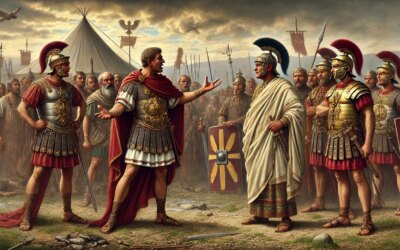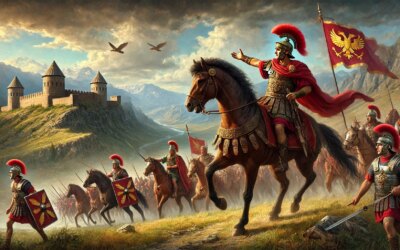Introduction: Rome’s Eastern Gamble
By the early 1st century BC, the Roman Republic had become the dominant power in the Mediterranean—but in the east, one man refused to bow. Mithridates VI of Pontus, a charismatic and tenacious ruler, had already clashed with Rome in two bitter wars. In 73 BC, renewed hostilities erupted into the Third Mithridatic War. Rome chose as its commander Lucius Licinius Lucullus—a general of stern discipline, intellectual refinement, and unexpected brilliance.
Lucullus: The Reluctant Commander
Lucullus was not a popular political figure in Rome. More known for his cultural sophistication and Stoic ideals than battlefield daring, he nonetheless proved a capable military mind. When war with Mithridates reignited, the Senate dispatched him to Asia Minor. There, Lucullus would face not only the armies of Pontus, but also political opposition, logistical nightmares, and one of the greatest military strategists of the Hellenistic world.
Mithridates VI: King of Kings
Mithridates VI Eupator of Pontus had long positioned himself as a liberator of the Greek East from Roman domination. Fluent in multiple languages and adept at intrigue, he forged alliances with eastern monarchs and mounted massive military campaigns. His earlier clashes with Rome had ended in temporary peace, but he remained a powerful and embittered adversary.
The Campaign of 72 BC
By 72 BC, Lucullus had pushed Mithridates back from western Asia Minor, reclaiming cities and restoring Roman rule. After defeating the Pontic forces at Cabira, Lucullus marched deep into enemy territory, through Armenia and Cappadocia. His campaign was characterized by swift movement, effective supply chains, and a keen understanding of terrain. Roman legions, despite being far from home, held their ground against numerically superior foes.
Strategic Brilliance and Harsh Conditions
Lucullus showed a remarkable grasp of siege warfare, cutting off supplies and leveraging his navy to isolate Mithridates. He also reformed local administration, imposed discipline among his troops, and respected local customs—earning him temporary support among eastern cities. However, the campaign’s length, fatigue, and brutal conditions began to erode morale. Roman soldiers, tired of endless marches and denied plunder, grew restless.
Internal Struggles and Political Undermining
While Lucullus achieved significant military victories, his political enemies in Rome—most notably Crassus and Pompey—plotted against him. Back in the Senate, his accomplishments were downplayed. His own troops, emboldened by propaganda and enticed by promises from rival commanders, mutinied in 67 BC. Despite his success in neutralizing Mithridates and bringing stability to Asia Minor, Lucullus was recalled.
The Aftermath and the Rise of Pompey
Pompey the Great succeeded Lucullus and took credit for the final defeat of Mithridates, though much of the groundwork had been laid by his predecessor. Lucullus retired to Rome, where he turned his attention to philosophy, art, and the construction of lavish villas. His name would later become synonymous with luxury—but his military legacy, often overshadowed, was no less formidable.
Legacy of the Third Mithridatic War
The war marked a turning point in Roman expansion eastward. Lucullus’ campaigns dismantled Mithridates’ power base and established Roman dominance over Asia Minor. His administration paved the way for the provinces of Bithynia and Pontus to become key parts of the empire. His blend of military precision and cultural tact left an enduring imprint on Roman eastern policy.
Conclusion: The General Behind the Feast
Though later generations remembered Lucullus for his opulent banquets, his true greatness lay in the mountain passes of Anatolia and the ruined strongholds of Pontus. In 72 BC, with banners raised and lightning at his back, Lucullus carved Rome’s will into the east—not with pageantry, but with precision. His was a triumph of strategy over spectacle, and it reshaped the fate of an empire.






